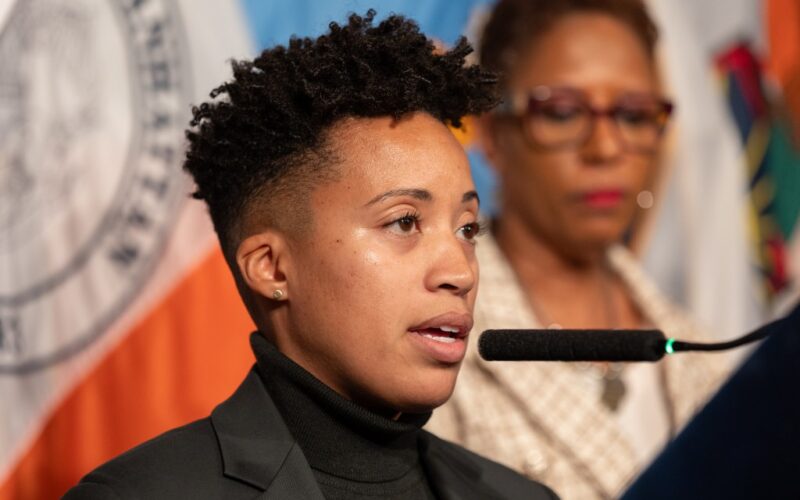Brooklyn Councilwoman Crystal Hudson, a leading candidate in this year’s City Council speaker race, raked in campaign cash from real estate interests at a time her website claimed she wasn’t accepting any such contributions, the Daily News has learned.
The donations in question came from, among others, lobbyists registered to represent real estate developers trying to advance projects in Hudson’s Central Brooklyn district.
The revelations could raise uncomfortable questions for Hudson as she has emerged as the top progressive Democrat campaigning to become the Council’s next speaker.
Many on the left have embraced commitments to reject campaign contributions from the city’s real estate sector, including incoming mayor Zohran Mamdani, a democratic socialist who hasn’t taken a stance on the speaker’s race, but could stand to exert influence over it. The other leading candidate running for speaker is Manhattan Councilwoman Julie Menin, a more moderate-leaning Democrat than Hudson.
The donation disclaimer on Hudson’s campaign website, which was displayed between at least 2021 and late August 2024, said she was “not taking any money from for-profit real estate developers” or “lobbyists who represent real estate,” screengrabs reviewed by The News show.
“If a donation is made from an individual who has interests inconsistent with this commitment, their donation will be refunded. Period,” the website entry read.
Hudson’s campaign deleted the entry from her website at some point after August 2024, according to a review of the site’s historical data.
But before her team removed that notice from the site, Hudson had already taken in campaign contributions from real estate developers and their lobbyists, filings show. She never returned any of those donations, filings also show.
Hudson, a member of the Council’s Progressive Caucus, told The News on Wednesday her team scrubbed the pledge from her website “during my 2025 reelection campaign,” though she didn’t have an exact date. She said she removed it “to reflect the changing reality of campaign finance in our city.”
Hudson said it’s “deeply insulting” to “imply that I can be bought for a few hundred dollars.”
“But let me be clear: I have never and will never make a decision based on a donation. For example, in November 2021, I received a donation from an individual, who later filed a rezoning application in May 2023. I ultimately rejected that proposal, showing clearly that I am unbought and unbossed,” Hudson said.
She noted she also returned a separate $250 donation from developer Yoel Teitelbaum in 2022 when he was seeking a rezoning for a project in her district.
But in February 2023, when the anti-real estate cash commitment was prominently displayed on her website, Hudson received a $175 contribution that she never refunded from an investment analyst at Madison International Realty, a real estate firm based in Manhattan. That donation eventually became worth $1,575 due to the city’s public matching funds program, records show.
Hudson, whose Council district includes Crown Heights, Prospect Heights and Clinton Hill, also took in nearly $1,900 in donations from lobbyists representing developers while the entry was on her site, according to campaign finance disclosures.
Some of those lobbyists, including ones working for the Bolton St. John’s firm, were registered to directly lobby Hudson on behalf of developers about projects in her district at the time they contributed to her campaign, paperwork shows.
That includes Bolton St. John’s partner Teresa Gonzalez in April 2022 giving Hudson’s reelection campaign $250 — the max a lobbyist can legally contribute to a Council member — while Gonzalez was registered to lobby her about a mixed-use development on Nostrand Avenue proposed by Hudson Companies, a major real estate firm, per filings.
Gonzalez gave Hudson another $250 in spring 2024 while being registered to lobby her about another development in her district that ultimately got rejected by the Council after Hudson opposed it.
Since deleting the donation disclaimer from her campaign website, Hudson has taken additional contributions from developers, including a matchable $250 contribution this past March from Jordan Sakni, CEO of Simba Property Group, records show.
Questions about real estate development are sure to animate the Council for years to come, as the city continues to deal with a severe housing crisis. The speaker, in particular, plays a big role in deciding what projects can move forward, and progressives have long argued the city should only prioritize developments that create majority affordable housing.
Incumbent Speaker Adrienne Adams is leaving office at the end of the year due to term limits.
The selection of a speaker is an internal process, under which the Council’s 51 members decide via a vote early next year who gets the job, widely seen as the second most powerful post in city government after the mayor.

Emil Cohen/NYC Council Media Unit
City Council Member Julie Menin. (Emil Cohen/NYC Council Media Unit)
Speaker races have traditionally been characterized by behind the scenes horse-trading, with political power-players like labor unions, county party bosses and incoming mayors taking on outsized influence.
Hudson appears to be the speaker candidate most ideologically aligned with Mamdani, who’s being sworn in as the next mayor Jan. 1.
She endorsed Mamdani’s campaign for mayor and said in a recent interview that she supports him because he has “met the needs of so many New Yorkers.” Mamdani, who returned thousands of dollars in donations that real estate executives tried to give his mayoral campaign, hasn’t said if he’s going to support any speaker candidate in particular.
Menin, the other leaning speaker candidate, didn’t endorse Mamdani’s mayoral bid.
Besides Hudson and Menin, Bronx Councilwoman Amanda Farias, Queens Councilwoman Selvena Brooks-Powers and Manhattan Councilman Chris Marte have campaigned this year to become speaker. Council insiders say Menin and Hudson are at this point seen as the front-runners.








